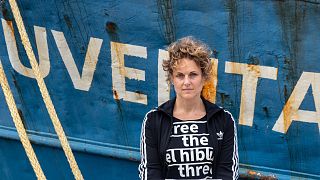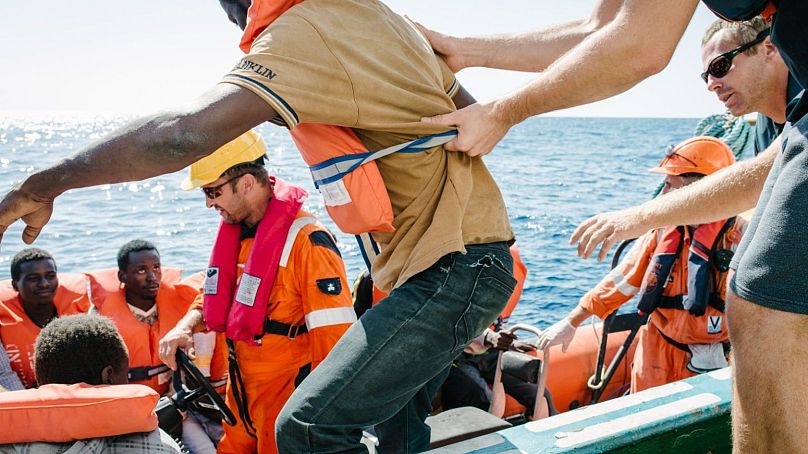These people face 20 years in jail for saving others from drowning in the Mediterranean

Even as outrage simmers over the hundreds of migrants dying at sea every year off Europe's coast, rescuers are still being persecuted for helping save lives.
Kathrin Schmidt helped save some 14,000 people who made the perilous journey across the Mediterranean to seek safety and a better future in Europe between 2016 and 2017.
Now, she faces charges that could see her behind bars for as long as 20 years.
Schmidt was head of operations aboard Iuventa, a rescue ship helping migrants in distress in the Med, when the vessel was seized by Italian authorities and her life-saving work abruptly interrupted.
Together with several of her colleagues, she was accused of “aiding and abetting illegal immigration” - a charge that carries a 20-year prison sentence.
At least 20 people, including NGO workers from other groups and four Iuventa crew members, are still involved in an ongoing trial in Italy.
A ‘politically motivated’ trial
Talking to Euronews, Schmidt is frustrated that, years later, she’s still stuck in a trial that’s moving forward slowly, but in a direction she finds “hard to buy into.”
“The whole trial is insane,” she said.
“They’re accusing us of cooperating with smugglers, of working clandestinely with underground organisations, saying that the people we rescued didn’t need rescuing.”
“They said that there was no need to rescue them because those were arranged handovers of people - but what we’re talking about were flimsy, overcrowded, tiny rubber boats or wooden boats that had hundreds of people on them, with a few people in critical medical conditions and no water or food,” she added.
According to Schmidt, the trial against her and the other rescuers is “very politically motivated."
"There’s a political agenda behind the criminal law and the proceedings," she claimed.
The Italian government has defended its harsh policies on illegal migration, and those helping migrants off its coasts, saying that the country is subjected to unbearable pressure from the surging number of people arriving on its shores, with little to no help from other EU countries.
Another EU country which reports a high number of migrants arriving in its territory every year is Greece, where the current government has also taken a harsh, criminalising stance on migrations.
On 14 June, an overcrowded fishing boat carrying an estimated 750 people capsized off the coast of Greece in one of the biggest tragedies in the Mediterranean in years.
Officials retrieved the 82 bodies, while hundreds are still considered missing. Only 104 people aboard survived.
Greek authorities, taking a strict approach to illegal migration, have been harshly criticised and accused of not acting quickly enough to help the clearly struggling vessel. Testimonies from survivors said the Greek Coast Guard had tied up the vessel and tried to pull it before it capsized -- a move that’s highly unusual in these cases and which witnesses said caused the boat to sway.
Greek authorities denied this happened and defended the actions of the Coast Guard. Talking to state broadcaster ERT, Hellenic Coast Guard spokesman Nikos Alexiou said that.,“There was no effort to tug the boat.”
He added: “You cannot carry out a violent diversion on such a vessel with so many people on board, without them wanting to, without any sort of cooperation.”
Tiring rescuers down
Schmidt, who before boarding the Iuventa had done work with NGOs helping migrants in Lesbos and the Aegean Sea, wanted to rescue people travelling across the Mediterranean Sea to “do justice to her privilege.”
“You’re in a position where you have the agency to act and to help others - a position of power and privilege that comes with a responsibility,” she said.
Now, she feels like the seizing of the Iuventa and the trial against her took away her freedom of choosing where to work and what to do.
“You could say it has turned my life upside down a little bit, because it has taken the decision away from me of where I want to work or what I want to spend my time doing,” she said.
“The impact of this trial is tremendous, and I find it very important to say that this trial is just one little bit in a context of strategic and systematic criminalisation of people on the move,” she continued.
According to Picum, a network of organisations providing assistance to and advocating for the rights of undocumented migrants in Europe, "the criminalisation of solidarity with migrants remains a widespread phenomenon across the EU."
The group said that at least 89 people were criminalised in the EU between January 2021 and March 2022 for helping migrants in distress at sea, with most of them being charged with facilitation of entry, transit or stay, or migrant smuggling.
Migrants too have also increasingly been criminalised in countries like Italy and Greece, where they're seen as a threat to national security rather than asylum seekers in need of assistance.
For Schmidt, getting the charges against her and her colleagues dropped is “not about protecting myself from going to prison,” but to secure a political win that will let people know rescuing migrants at sea is the right thing to do.
“We are living through extremely difficult times in Europe and we are heading into a disaster on all sorts of levels,” she said, adding that persecuting rescuers is a political strategy aimed at exhausting NGOs wanting to help.
The trial has been “draining” and tiring, she confirmed.
“It’s taking resources, time and money and it’s weakening all political structures. [The trial] is a systematic tool that states use to oppress resistance movements, to shut people up and to shut people down.”
Border protection over saving lives
In May, defence lawyers for Schmidt and other rescuers from Doctors Without Borders and Save the Children pushed forward a request to consider the crime of aiding and abetting migration illegal, since this would contradict fundamental rights stated in the Italian Constitution and the EU Charter of Fundamental Rights.
At a hearing last week, an Italian court in Trapani, Sicily, ruled that border protection prevails over human rights, rejecting the defence lawyers’ request.
“We wanted the High Courts to decide once and for all on the balance between border protection and the protection of human beings,” said Francesca Cancellaro, Iuventa’s lawyer.
“But the judge denied Iuventa and everyone this possibility. The decision is unsatisfactory as much for the outcome as for the arguments that support it. But we will certainly not stop here.”
“With so many people desperate enough to risk their lives to access protection and safety in Europe, it is urgent that a reform of the offence of ‘facilitation of irregular migration’ takes place,” Elisa De Pieri, researcher at the Europe regional office of Amnesty International, said commenting on the Italian court’s decision.
There needs to be an "immediate end to its harmful and abusive application to people saving lives,” she added.
But the battle to defend solidarity over border protection continues.
Schmidt doesn’t think she will actually be forced to go to jail for 20 years. “I just don’t see that,” she said with confidence.
The Iuventa ship, meanwhile, has remained blocked in an Italian port for six years now. More than 10,000 people are estimated to have died in the Mediterranean off the coast of Italy between 2018 and 2023.
A total of 959 migrants have drowned off the coast of the country or is still considered missing in the months between January and May 2023 alone.

No comments:
Post a Comment